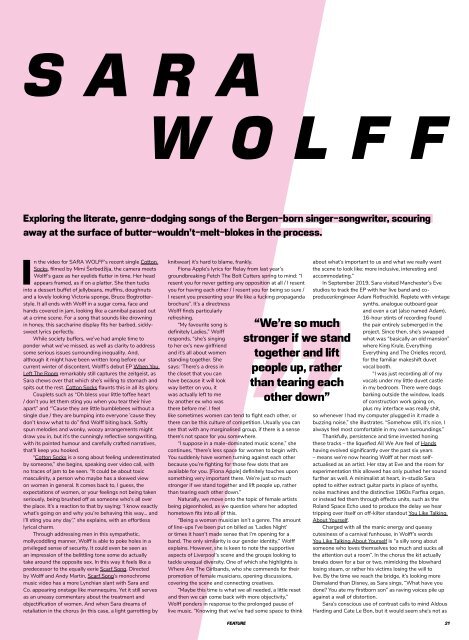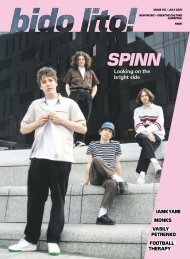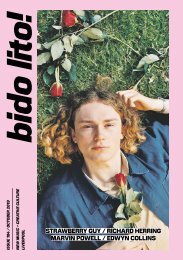Issue 113 / April-May 2021
April-May 2021 issue of Bido Lito! magazine. Featuring: PIXEY, AYSTAR, SARA WOLFF, DIALECT, AMBER JAY, JANE WEAVER, TATE COLLECTIVE, DEAD PIGEON GALLERY, DAVID ZINK YI, SAM BATLEY, FURRY HUG, FELIX MUFTI-WRIGHT, STEALING SHEEP and much more.
April-May 2021 issue of Bido Lito! magazine. Featuring: PIXEY, AYSTAR, SARA WOLFF, DIALECT, AMBER JAY, JANE WEAVER, TATE COLLECTIVE, DEAD PIGEON GALLERY, DAVID ZINK YI, SAM BATLEY, FURRY HUG, FELIX MUFTI-WRIGHT, STEALING SHEEP and much more.
Create successful ePaper yourself
Turn your PDF publications into a flip-book with our unique Google optimized e-Paper software.
SARA<br />
WOLFF<br />
Exploring the literate, genre-dodging songs of the Bergen-born singer-songwriter, scouring<br />
away at the surface of butter-wouldn’t-melt-blokes in the process.<br />
In the video for SARA WOLFF’s recent single Cotton<br />
Socks, filmed by Mimi Šerbedžija, the camera meets<br />
Wolff’s gaze as her eyelids flutter in time. Her head<br />
appears framed, as if on a platter. She then tucks<br />
into a dessert buffet of jellybeans, muffins, doughnuts<br />
and a lovely looking Victoria sponge, Bruce Bogtrotterstyle.<br />
It all ends with Wolff in a sugar coma, face and<br />
hands covered in jam, looking like a cannibal passed out<br />
at a crime scene. For a song that sounds like drowning<br />
in honey, this saccharine display fits her barbed, sicklysweet<br />
lyrics perfectly.<br />
While society buffers, we’ve had ample time to<br />
ponder what we’ve missed, as well as clarity to address<br />
some serious issues surrounding inequality. And,<br />
although it might have been written long before our<br />
current winter of discontent, Wolff’s debut EP When You<br />
Left The Room remarkably still captures the zeitgeist, as<br />
Sara chews over that which she’s willing to stomach and<br />
spits out the rest. Cotton Socks flaunts this in all its glory.<br />
Couplets such as “Oh bless your little toffee heart<br />
/ don’t you let them sting you when you tear their hive<br />
apart” and “’Cause they are little bumblebees without a<br />
single clue / they are bumping into everyone ’cause they<br />
don’t know what to do” find Wolff biting back. Softly<br />
spun melodies and wonky, woozy arrangements might<br />
draw you in, but it’s the cunningly reflective songwriting,<br />
with its pointed humour and carefully crafted narratives,<br />
that’ll keep you hooked.<br />
“Cotton Socks is a song about feeling underestimated<br />
by someone,” she begins, speaking over video call, with<br />
no traces of jam to be seen. “It could be about toxic<br />
masculinity, a person who maybe has a skewed view<br />
on women in general. It comes back to, I guess, the<br />
expectations of women, or your feelings not being taken<br />
seriously, being brushed off as someone who’s all over<br />
the place. It’s a reaction to that by saying: ‘I know exactly<br />
what’s going on and why you’re behaving this way… and<br />
I’ll sting you any day’,” she explains, with an effortless<br />
lyrical charm.<br />
Through addressing men in this sympathetic,<br />
mollycoddling manner, Wolff is able to poke holes in a<br />
privileged sense of security. It could even be seen as<br />
an impression of the belittling tone some do actually<br />
take around the opposite sex. In this way it feels like a<br />
predecessor to the equally eerie Scarf Song. Directed<br />
by Wolff and Andy Martin, Scarf Song’s monochrome<br />
music video has a more Lynchian slant with Sara and<br />
Co. appearing onstage like mannequins. Yet it still serves<br />
as an uneasy commentary about the treatment and<br />
objectification of women. And when Sara dreams of<br />
retaliation in the chorus (in this case, a light garrotting by<br />
knitwear) it’s hard to blame, frankly.<br />
Fiona Apple’s lyrics for Relay from last year’s<br />
groundbreaking Fetch The Bolt Cutters spring to mind: “I<br />
resent you for never getting any opposition at all / I resent<br />
you for having each other / I resent you for being so sure /<br />
I resent you presenting your life like a fucking propaganda<br />
brochure”. It’s a directness<br />
Wolff finds particularly<br />
refreshing.<br />
“We’re so much<br />
stronger if we stand<br />
together and lift<br />
people up, rather<br />
than tearing each<br />
other down”<br />
“My favourite song is<br />
definitely Ladies,” Wolff<br />
responds, “she’s singing<br />
to her ex’s new girlfriend<br />
and it’s all about women<br />
standing together. She<br />
says: ‘There’s a dress in<br />
the closet that you can<br />
have because it will look<br />
way better on you, it<br />
was actually left to me<br />
by another ex who was<br />
there before me’. I feel<br />
like sometimes women can tend to fight each other, or<br />
there can be this culture of competition. Usually you can<br />
see that with any marginalised group, if there is a sense<br />
there’s not space for you somewhere.<br />
“I suppose in a male-dominated music scene,” she<br />
continues, “there’s less space for women to begin with.<br />
You suddenly have women turning against each other<br />
because you’re fighting for those few slots that are<br />
available for you. [Fiona Apple] definitely touches upon<br />
something very important there. We’re just so much<br />
stronger if we stand together and lift people up, rather<br />
than tearing each other down.”<br />
Naturally, we move onto the topic of female artists<br />
being pigeonholed, as we question where her adopted<br />
hometown fits into all of this.<br />
“Being a woman musician isn’t a genre. The amount<br />
of line-ups I’ve been put on billed as ‘Ladies Night’<br />
or times it hasn’t made sense that I’m opening for a<br />
band. The only similarity is our gender identity,” Wolff<br />
explains. However, she is keen to note the supportive<br />
aspects of Liverpool’s scene and the groups looking to<br />
tackle unequal diversity. One of which she highlights is<br />
Where Are The Girlbands, who she commends for their<br />
promotion of female musicians, opening discussions,<br />
covering the scene and connecting creatives.<br />
“<strong>May</strong>be this time is what we all needed, a little reset<br />
and then we can come back with more objectivity,”<br />
Wolff ponders in response to the prolonged pause of<br />
live music. “Knowing that we’ve had some space to think<br />
about what’s important to us and what we really want<br />
the scene to look like: more inclusive, interesting and<br />
accommodating.”<br />
In September 2019, Sara visited Manchester’s Eve<br />
studios to track the EP with her live band and coproducer/engineer<br />
Adam Rothschild. Replete with vintage<br />
synths, analogue outboard gear<br />
and even a cat (also named Adam),<br />
16-hour stints of recording found<br />
the pair entirely submerged in the<br />
project. Since then, she’s swapped<br />
what was “basically an old mansion”<br />
where King Krule, Everything<br />
Everything and The Orielles record,<br />
for the familiar makeshift duvet<br />
vocal booth.<br />
“I was just recording all of my<br />
vocals under my little duvet castle<br />
in my bedroom. There were dogs<br />
barking outside the window, loads<br />
of construction work going on,<br />
plus my interface was really shit,<br />
so whenever I had my computer plugged in it made a<br />
buzzing noise,” she illustrates. “Somehow still, it’s nice, I<br />
always feel most comfortable in my own surroundings.”<br />
Thankfully, persistence and time invested honing<br />
these tracks – the liquefied All We Are feel of Hands<br />
having evolved significantly over the past six years<br />
– means we’re now hearing Wolff at her most selfactualised<br />
as an artist. Her stay at Eve and the room for<br />
experimentation this allowed has only pushed her sound<br />
further as well. A minimalist at heart, in-studio Sara<br />
opted to either extract guitar parts in place of synths,<br />
noise machines and the distinctive 1960s Farfisa organ,<br />
or instead fed them through effects units, such as the<br />
Roland Space Echo used to produce the delay we hear<br />
tripping over itself on off-kilter standout You Like Talking<br />
About Yourself.<br />
Charged with all the manic energy and queasy<br />
cutesiness of a carnival funhouse, in Wolff’s words<br />
You Like Talking About Yourself is “a silly song about<br />
someone who loves themselves too much and sucks all<br />
the attention out a room”. In the chorus the kit actually<br />
breaks down for a bar or two, mimicking the blowhard<br />
losing steam, or rather his victims losing the will to<br />
live. By the time we reach the bridge, it’s looking more<br />
Dismaland than Disney, as Sara sings, “What have you<br />
done? You ate my firstborn son” as raving voices pile up<br />
against a wall of distortion.<br />
Sara’s conscious use of contrast calls to mind Aldous<br />
Harding and Cate Le Bon, but it would seem she’s not as<br />
FEATURE<br />
21

















